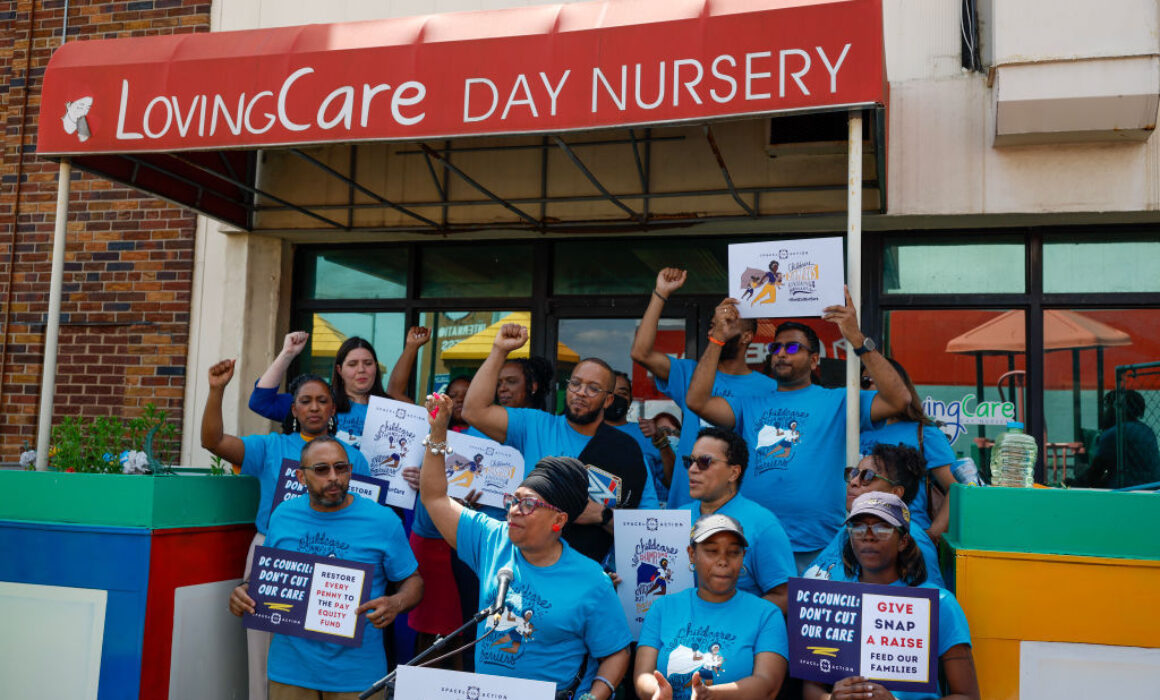Why Care Needs an Industrial Strategy Too
May 23, 2024
Solving the care crisis requires government to step up.
The Roosevelt Rundown features our top stories of the week.

Childcare workers rally against funding cuts on May 8, 2023, in Washington, DC. (Photo by Tasos Katopodis Stringer/Getty Images)
Investing in the Care Economy
In recent years, the US government has taken bold steps to shore up infrastructure, renewable energy, and the semiconductor industry, reimagining the role of the state as a post-neoliberal era emerges. In a new brief, Roosevelt’s Suzanne Kahn asks: What if we could do the same for the care economy?
Care workers, who are disproportionately women and people of color, include childcare workers and home health aides, as well as others who provide support to the most vulnerable members of society. Particularly in the wake of the pandemic, the supply of care workers has plummeted, even while demand continues to rise. Costs are high, but wages stay low. “As a society and country, we desperately need care industries,” writes Kahn, “but markets alone are not providing sufficient access to them.”
The brief explores pathways for government to invest in care through public funding, existing structures such as Medicare/Medicaid and private insurance, and state-level interventions. It also lays out guardrails to protect workers and small providers, limit corporate power, and ensure quality of care.
“This sizable and growing sector of the economy must be understood as a set of vital industries that the government can and should foster—a sector that requires an industrial policy of its own,” writes Kahn.
Read more in “Investing in Care: Exploring an Industrial Strategy for Care Work.”
Addressing Community Concerns in the Green Transition
Achieving net-zero emissions will require an unprecedented mobilization of domestic production and large-scale planning. But deploying renewable energy without taking into account community and environmental concerns would be a serious misstep, argues Roosevelt’s Sunny Malhotra in a new blog post.
Malhotra makes the case through two examples of public works projects. First, the US Federal-Aid Highway Act of 1956 built thousands of miles of roads across the country, but did so by paving through and destroying Black communities and urban centers. In Spain, solar energy deployment has been highly successful, but despite generous government subsidies, some households still can’t afford to install solar. In addition, rural and agricultural communities have raised concerns about land use. In both of these situations, community engagement and a consideration of social consequences could have made for a smoother and more equitable transition.
“History shows us that failure to address community concerns around large-scale federal projects will only serve to deepen existing inequities, slow overall deployment, and open the door for serious political backlash to these necessary energy developments,” writes Malhotra.
Read more in “Large-Scale Solar Energy Build-Out Requires Community Engagement.”
What We’re Talking About
NEW! We’ve joined over 100 national public interest groups to demand bold tax reform next year when the #TCJA measures begin to expire. #TaxLetter
This is one necessary step in creating truly shared, equitable growth and prosperity. https://t.co/86HU9WKALq pic.twitter.com/j2in2AryQk
— Roosevelt Institute (@rooseveltinst) May 22, 2024
What We’re Reading
The Campaign to Gut Washington’s Power over Corporate America – feat. Roosevelt Fellow Todd Phillips – Politico
Justice Department Says Illegal Monopoly by Ticketmaster and Live Nation Drives Up Prices for Fans – Associated Press
Reaganomics Is on Its Last Legs – The Atlantic
The Art of the Green New Deal – Jacobin